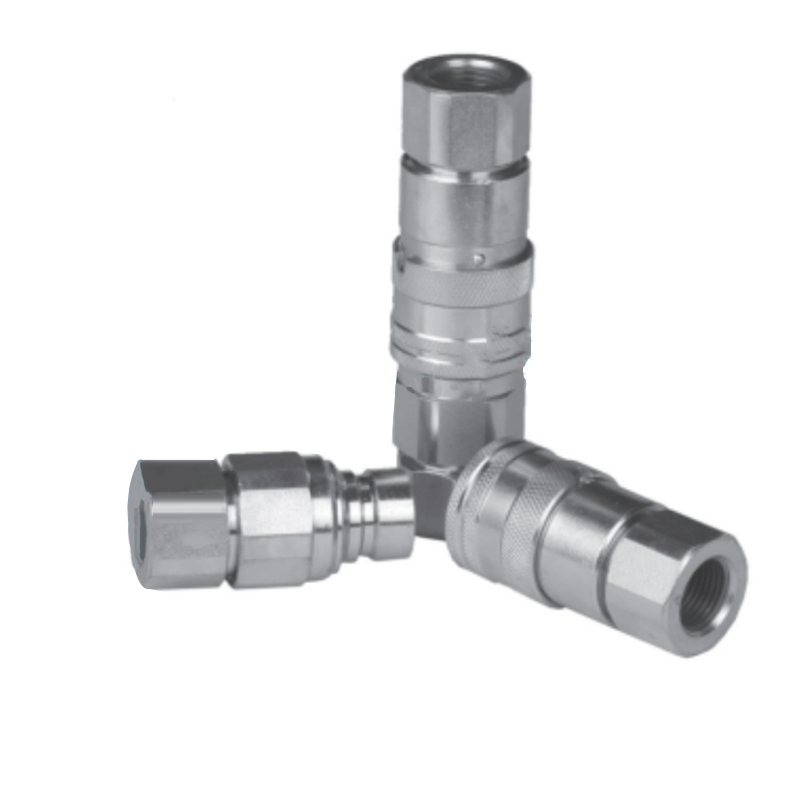Can flat face hydraulic couplers be used with various hydraulic fluids and pressures?
Flat face hydraulic couplers are designed to be versatile and compatible with a wide range of hydraulic fluids and pressures. However, there are some considerations to keep in mind:
1.Hydraulic Fluid Compatibility:
Hydraulic fluids come in various formulations, including mineral-based oils, synthetic fluids, biodegradable oils, and water-based fluids. Flat face hydraulic couplers are designed with materials that are compatible with different types of fluids. This compatibility is essential to prevent chemical reactions, degradation of materials, and leakage. When selecting flat face hydraulic couplers, verify that the materials used in their construction are suitable for the specific hydraulic fluid you intend to use.
2.Pressure Ratings:
Flat face hydraulic couplers are manufactured to handle specific pressure ranges. These pressure ratings indicate the maximum pressure the couplers can safely accommodate without failing or causing leaks. It's crucial to choose couplers with pressure ratings that match or exceed the maximum operating pressure of your hydraulic system. Using couplers with insufficient pressure ratings can result in coupler failure, fluid leakage, and compromised system performance.
3.Temperature Range:
Hydraulic systems can experience a wide range of temperatures due to external environmental conditions or the system's operational demands. The materials used in flat face hydraulic couplers must be capable of withstanding these temperature extremes without becoming brittle, deforming, or losing their sealing properties. Always ensure that the selected couplers can maintain their integrity and functionality within the temperature range your hydraulic system may encounter.
4.Sealing Mechanism:
Flat face hydraulic couplers typically utilize O-rings or other sealing mechanisms to create a tight connection between mating couplers. These seals prevent fluid leakage and contamination. Selecting the appropriate type of seal material is crucial to ensure compatibility with the hydraulic fluid and the pressure conditions. Different seals may be required for different fluids and pressures to maintain an effective seal and prevent leaks.
5.Application Considerations:
The application in which flat face hydraulic couplers are used can impact their compatibility requirements. Industries such as construction, agriculture, manufacturing, and mining might have unique fluid and pressure demands. For instance, applications involving high temperatures, aggressive chemicals, or exposure to external elements may necessitate specialized couplers designed to withstand these conditions.
6.Manufacturer Guidelines:
Manufacturers provide detailed information about the compatibility of their flat face hydraulic couplers with various hydraulic fluids and pressure ranges. This information is typically available in product documentation, catalogs, and technical specifications. Always consult the manufacturer's guidelines and recommendations to ensure that the couplers you choose align with the specific hydraulic fluids and pressures in your system.
7.Testing and Verification:
Before integrating flat face hydraulic couplers into your hydraulic system, conduct compatibility tests to verify their performance under the intended fluid and pressure conditions. Testing can reveal any issues related to material compatibility, sealing effectiveness, and pressure tolerance. This proactive approach helps identify potential problems and ensures the safe and reliable operation of your hydraulic system.
GT-FF Series couplings are widely used in the public utility market where hydraulic oil spillage can constitute a serious safety hazard, particularly in overhead bucket hoists that are
used for maintenance of high-voltage power transmission lines. These couplings are also used for quick change of hydraulic Tools in construction,railway maintenance and mining industries. The ease of cleaning makeshift themideal for use in these types of hostile environments.













Contact Us